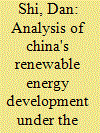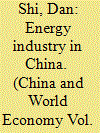| Srl | Item |
| 1 |
ID:
086616


|
|
|
|
|
| Publication |
2009.
|
| Summary/Abstract |
At present, the development of renewable energy relies mainly on government support. The government invests in a considerable number of projects to improve public welfare and to assist in poverty relief. If China is to replace fossil fuels on a large scale with renewable energy sources, the production costs and prices of renewable energy must be brought down. All countries are facing the challenge of moving to a more secure and low-carbon energy system without weakening economic and social development. In this regard, China is facing an even greater challenge in terms of economic cost, as cheap coal remains the main energy form. Technical innovation and industrialization in the area of renewable energy is an important means of lowering cost. China is in for a period of high-speed development of its economy and the rising demand for energy is irreversible. If the technical progress and development speed of renewable energy lags behind the growth in demand, it will be difficult to realize the improvement of its energy structure.
|
|
|
|
|
|
|
|
|
|
|
|
|
|
|
|
| 2 |
ID:
064617


|
|
|
|
|
| Publication |
Jul-Aug 2005.
|
|
|
|
|
|
|
|
|
|
|
|
|
|
|
|
| 3 |
ID:
166368


|
|
|
|
|
| Summary/Abstract |
It is important to encourage people to form energy conservation habits to increase energy efficiency. The application of social psychology research paradigm in studying energy conservation behavior sheds more light on what conditions are necessary for sustained energy conservation behavior. Based on a survey of 234 college students in Beijing, this study was carried out using the VBN model as its analysis framework and a structural equation model while focusing on whether egocentric values necessarily lead to non-energy conservation behavior and whether altruistic and biospheric values inevitably lead to energy conservation behavior among college students. The following conclusions can be drawn. First, the study partially verified the basic conclusion of the VBN model, that is, values have a significant effect on energy conservation beliefs, which in turn significantly affect personal energy conservation norms. Second, energy conservation beliefs formed by altruistic and biospheric values are translated into real energy conservation norms. However, egocentric values do not significantly affect the attribution of energy conservation responsibility. Moreover, personal energy conservation norms do not translate into energy conservation behavior. Third, individual behavioral habits and external conditions do not promote the translation of personal norms into real energy conservation behavior.
|
|
|
|
|
|
|
|
|
|
|
|
|
|
|
|